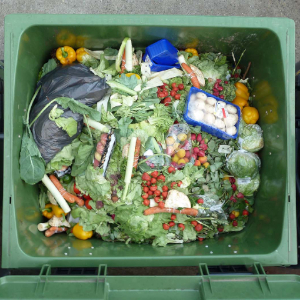I just about fainted when I read the headline: ‘UN report says households waste 1 billion meals daily’. That statement brings the food waste crisis into stark focus. And it cries out for a solution to this insidious threat to food sustainability…
 Starving Gazan Children: Every one of Gaza’s 2.3 million people are at risk of starvation…
Starving Gazan Children: Every one of Gaza’s 2.3 million people are at risk of starvation…
Staggering numbers
The latest UN Food Waste Index, published last week ahead of Zero Waste Day, reported that households around the world threw out more than $1 trillion worth of food PER DAY in 2022 (the most recent year for which figures are available). That’s an estimated 1 billion meals going to waste every day. And at the same time, more than 783 million people were going hungry every day.
“Some 19 per cent of food available to consumers was lost overall at retail, food service, and household levels,” UN News reported. “That is in addition to around 13 per cent of food lost in the supply chain, as estimated by the UN Food and Agriculture Organization (FAO), from post-harvest up to the point of sale.”
“Food waste is a global tragedy. Millions will go hungry today as food is wasted across the world,” said Inger Andersen, Executive Director of the UN Environmental Program (UNEP), said. And she adds, we could serve every starving person on that list at least one nutritious meal every day. Using what we now waste.
Issue ‘snapshots’:
Not just a problem among the ‘haves’
The UN notes there has been a ‘convergence’ between rich and poor countries in recent years. “High-income, upper-middle income, and lower-middle income countries differ in average levels of household food waste by just 7 kg / 15.4 lb. per capita per year. ” The overall per capita average is 79 kg / 173.8 lb.
But there’s a growing divergence between the urban and rural demographics world wide. “In middle-income countries, for example, rural areas are generally wasting less. One possible explanation is in the recycling of food scraps for pets, animal feed, and home composting in the countryside.”
Consumers the worst offenders
In spite of massive loses at the farm gate, through the wholesale food chain, and at the retails store level, the Report notes, scathingly, that household are responsible for 60 percent of the overall food waste tally.
The report calls for increased efforts by urban governments to promote and support home composting by city-core dwellers and suburbanites.
Greenhouse Gas impact
Decomposing food in waste disposal sites is estimated to contribute 10 percent of the world’s greenhouse gas emissions. That’s 5 times more, the report notes, than is produced by all the jet aircraft operating in the world.
Change IS possible
For those who say the problem is impossible to solve, the Report holds up Japan and the UK as examples countries that have reduced food waste by 18 and 31 percent, respectively.
The winning formula is based on, “public-private partnerships to reduce food waste and impacts on climate and water stress are being embraced by a steadily growing number of governments of all levels.”
My take
All the mega-issue numbers and proposed solutions aside… It’s clear that the main vector on which we should attack food waste is the home front.
We can each do our bit by…
- Planning meals ahead that use healthy, nutritious foods. And follow-up with meals that will employ leftovers.
- Making shopping lists… And sticking to them.
- No impulse buys.
- No ‘jumbo’, or ‘family-sized’ packs (some of whose contents will probably go bad before you can use them).
- No BOGOs or multi-buy deals.
Let’s not forget the UNEP’s exhortation to compost at home. And that just might lead, naturally, to growing your own veggies and herbs – even if you only have room for window boxes!
~ Maggie J.

